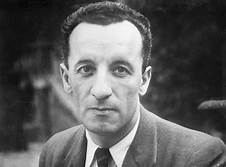[vc_column_text css=”.vc_custom_1552027008511{margin-top: 10% !important;margin-right: 10% !important;margin-left: 10% !important;padding-top: 7% !important;padding-right: 7% !important;padding-bottom: 7% !important;padding-left: 7% !important;background-color: #ddc49b !important;}”]
We know not through our intellect but through our experience.
Maurice Merleau-Ponty (Eng. 1962)
 Sarah Redshaw gives us the following review of February’s Monthly Meet gathering to discuss Maurice Merleau-Ponty’s book, The Phenomenology of Perception, a ground breaking work in the history of Western philosophy:
Sarah Redshaw gives us the following review of February’s Monthly Meet gathering to discuss Maurice Merleau-Ponty’s book, The Phenomenology of Perception, a ground breaking work in the history of Western philosophy:
In contrast to the approach of the objective sciences, the approach of phenomenology indicates that our experience of the world is determined by our bodies. Maurice Merleau-Ponty’s Phenomenology of Perception is a standout in the western philosophical tradition. Taking the body as the basis, perception is explored as a means of engaging with the world. While limited within the horizons of our perception as embodied beings, the body allows us to be in the world and to take in that world. It impresses on us as we attempt to get whole impressions.Much of the book is arguing with the tradition and dominance of positivism— a philosophical system that holds that every rationally justifiable assertion can be scientifically verified or is capable of logical or mathematical proof, an approach that has become almost unexamined ‘common sense’ in the modern world.Merleau Ponty, by contrast, brings us back to the body in important ways. By examining sensation and attention it is evident that we are not mere observers of the world but participants in it. Returning the science of perception to its origins, Merleau-Ponty has to confront and challenge almost the whole Western tradition though there are threads throughout that present alternatives. Dominant thinking favours seeing everything as object, including our own bodies and every other. Perception presents a problem because it highlights our experiencing being, which is neither purely subject nor object. The idea of subjectivity is only necessary when all is objectified. Subjectivising our ‘private’ experiences is meant to separate them from the ability to see objectively so valued in science.However Merleau-Ponty highlights the involvement of our embodied perception in science, in our whole way of seeing. This does not mean we cannot experience anything as outside ourselves or experience anything beyond ourselves. Our bodies not only enable experiences beyond ourselves, they require them. It is necessary for us to participate in the world in order to be and to perceive. As we are not disembodied minds but experiencing bodies we cannot escape experience no matter how limited. Knowledge is still possible but it needs to be connected to the experiencing world of embodiment.The Phenomenology of Perception was an earlier work and later works further articulated and developed Merleau-Ponty’s attempt to carve alternatives to the preference for disembodied, objectifying theoretical frameworks, which allows the development of particular kinds of knowledge separated from the ground of the life world. An approach that has led to the increasing objectification of not only our world, but also of our sense of our own inner self.
He argued that our horizon may be limited but it is also our means of being in the world and experiencing our own bodies as well as what is beyond our own bodies. Art can in many ways more fully articulate this kind of perspective as it is allowed to draw on and appeal to the world of embodiment and experience and to illustrate different perspectives in the life world of which we have some experience, even if partial. As long as we know our experience is partial we can perhaps bring perspectives together or give expression to a range of perspectives to expand our experience and to build broader knowledge.
That to me is where Merleau-Ponty leaves us, having drawn out and highlighted the significance and wonder of our experience.

![Call of the Dakini | A Memoir of a Life Lived [Extract]](https://regenesis.org.au/wp-content/uploads/2023/08/Catalogue-OF-Articles-by-Barbara-Lepani-July-2018-July-2023-.jpg)
Recent Comments